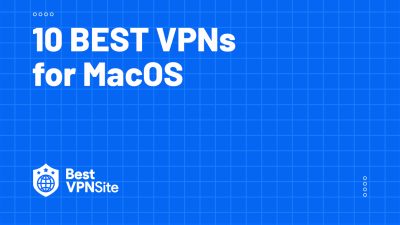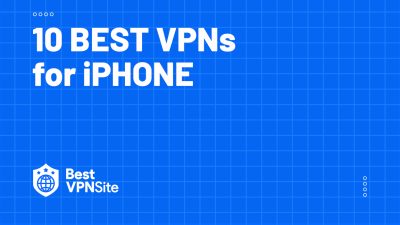10 Best VPNs for Linux in 2025: Top Picks for Ubuntu, Linux Mint & More
In 2025, having a reliable VPN tailored for Linux users is more important than ever. Popular Linux distributions like Ubuntu and Linux Mint continue to attract users seeking a secure, efficient computing environment. However, finding the right VPN for Linux isn't always straightforward. Many users need VPNs that provide robust command line VPN for Linux options, while others prefer a VPN with GUI for Linux to simplify use.
In this article, we explore the 10 best VPNs for Linux in 2025 that deliver excellent compatibility across major distributions, fast and stable performance, and strong security features. Whether you’re using Ubuntu, Linux Mint, or another distro, our curated list covers VPNs built to meet your needs with both CLI and GUI options, plus free plans for cost-conscious users.
Why You Need a VPN for Linux in 2025
A Virtual Private Network (VPN) creates an encrypted tunnel between your device and the internet. This encryption hides your online activities from hackers, ISPs (internet service providers), and surveillance agencies.
Even though Linux is renowned for its security advantages, Linux users still need VPNs to enhance privacy and security. VPNs protect your data from prying eyes by encrypting all network traffic, a vital benefit on Linux-compatible VPNs.
Here’s why Linux users should consider a VPN in 2025:
- Enhanced Online Privacy and Security: Despite Linux’s solid security track record, VPNs add a critical layer of protection. VPN encryption safeguards your data when browsing, especially from sophisticated cyber threats or government surveillance.
- Access to Geo-Restricted Content: Using a VPN allows Linux users to bypass regional limitations on streaming services, news sites, and apps. This unlocks global content libraries that might otherwise be inaccessible on your Ubuntu or Linux Mint system. Check out our guide on 10 Best VPNs for Streaming in 2025 to see which Linux-compatible VPNs excel at unblocking geo-restricted content.
- Protection on Public Wi-Fi: Public networks are hotbeds for data theft. VPNs shield your Linux device on open Wi-Fi networks by preventing eavesdropping from hackers or malicious actors, similar to recommendations in our 10 Best VPNs for USA in 2025 post where public Wi-Fi protection is emphasized.
- Avoid ISP Throttling and Censorship: VPNs mask your internet traffic so ISPs can’t throttle bandwidth or impose censorship. This is essential for maintaining fast, unrestricted internet access on Linux.
According to experts at Comparitech and TechRadar, Linux users gain significant privacy and performance benefits by choosing the best VPN for Linux Ubuntu in 2025 and utilizing VPNs that support Linux Mint.
Criteria for Choosing VPNs Suitable for Linux in 2025
Selecting the right VPN for Linux involves more than price or brand name. Here are the essential criteria to guide your decision:
Full Linux Compatibility
Not all VPNs support the diverse Linux landscape. The best VPNs for Linux provide native support across popular distributions including Ubuntu, Linux Mint, Fedora, and Arch Linux. Look for VPNs that explicitly list compatibility to avoid setup headaches.
Command Line and GUI Clients
Linux users vary from command line aficionados to desktop users who prefer graphical interfaces. Top VPNs offer both:
- Command line VPN for Linux: For advanced users who automate scripts or work in headless environments, CLI clients provide powerful, scriptable connectivity.
- VPN with GUI for Linux: For those favoring ease of use, GUIs simplify connection management and settings controls.
Offering both options ensures broad usability across skill levels.
Strong Security Features
Security is paramount. The VPN should support strong protocols like OpenVPN and WireGuard, include features like a kill switch and DNS leak protection, and maintain a strict no-logs policy for privacy. These security fundamentals are also highlighted in our 10 Best VPNs for Torrenting in 2025, especially regarding kill switches and no-logs policies.
Speed and Performance
Linux users often require high-speed connections, particularly on servers or when streaming. VPNs optimized for Linux minimize latency and bandwidth loss. Support for WireGuard protocol is a plus for fast, lightweight encryption. For more on speed considerations, see 10 Best VPNs for Gaming in 2025, which also stresses low latency and fast connection.
Free Trials and Guarantees
Choosing among VPNs can be risky without testing. The best Linux-compatible VPNs offer free trials, generous money-back guarantees, or free VPNs for Linux users to reduce purchase risks and build trust.
Expert Customer Support
Linux can be tricky to configure. VPN providers with knowledgeable support teams experienced in Linux setup and troubleshooting make a big difference in ensuring smooth VPN experiences.
Combined, these factors define Linux-compatible VPNs worthy of being in the 10 best VPNs for Linux in 2025.
Quick Comparison of 10 Best VPNs for Linux in 2025
| VPN Name | Why Suitable | Best For |
|---|---|---|
| NordVPN | Supports CLI and GUI, fast, secure, reliable unblocking | Best Overall |
| Private Internet Access | Native Linux GUI, highly customizable | Best for Linux Mint |
| Mullvad VPN | Command line focused, anonymous accounts | Best Command Line VPN |
| Proton VPN | Polished GUI & CLI, unlimited free plan | Best GUI VPN |
| Windscribe | Strong free tier, CLI client, ad & malware blocking | Best Free VPN for Linux |
| IVPN | Fast WireGuard/OpenVPN speeds, CLI support | Best for Speed |
| ExpressVPN | Top-notch security, reliable CLI app | Best for Security |
| Surfshark | Affordable, unlimited devices, CLI and GUI | Best Budget Option |
| TunnelBear | Simple CLI install, beginner-friendly | Best for Ease of Use |
| Hide.me | Wide distro support, CLI & GUI options, free plan | Best Multi-Distro Support |
Detailed Product Reviews
1. NordVPN
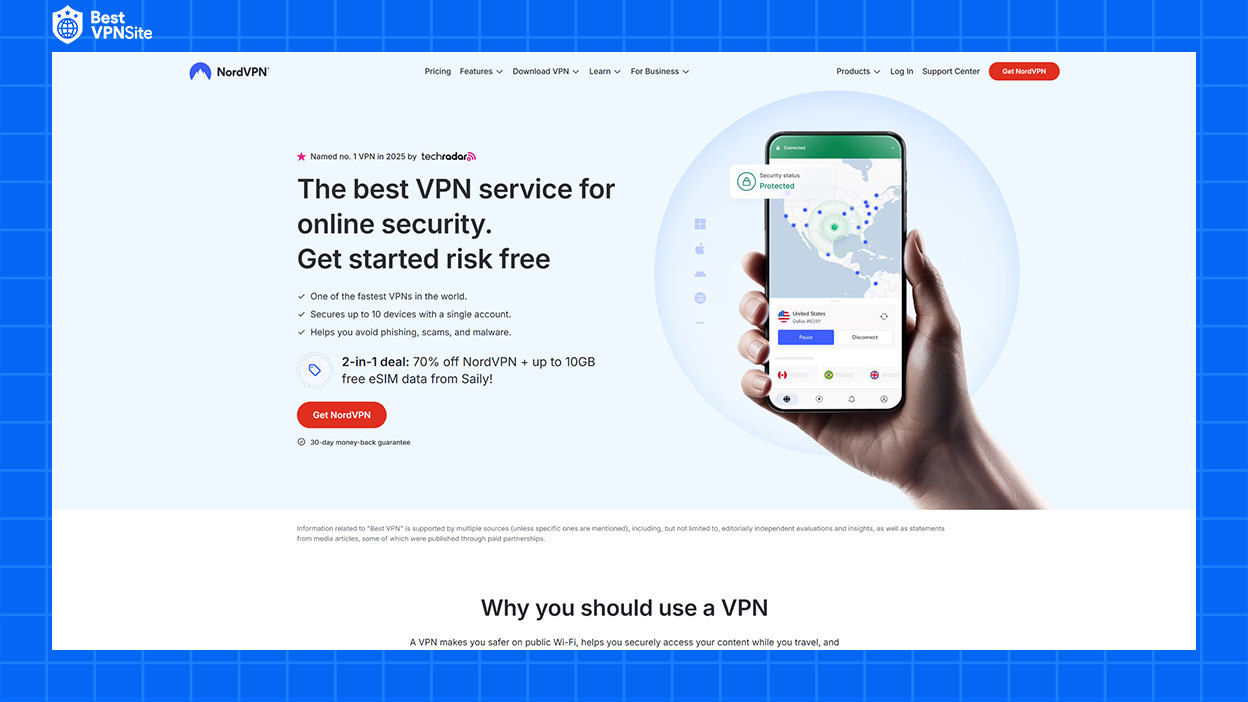
NordVPN leads the pack as the best VPN for Linux Ubuntu in 2025, providing full Linux compatibility. It supports popular distros like Ubuntu, Linux Mint, Debian, Fedora, and Arch. Both command line VPN for Linux and GUI options are available through native CLI tools and third-party open-source projects, catering to all users.
All Features:
- Supports Ubuntu, Mint, Debian, Fedora, Arch
- Native CLI client and GUI options (via open-source apps)
- Security protocols: OpenVPN, WireGuard-based NordLynx, kill switch, DNS leak protection
- High-speed servers optimized for Linux environments
- 30-day money-back guarantee
Pricing:
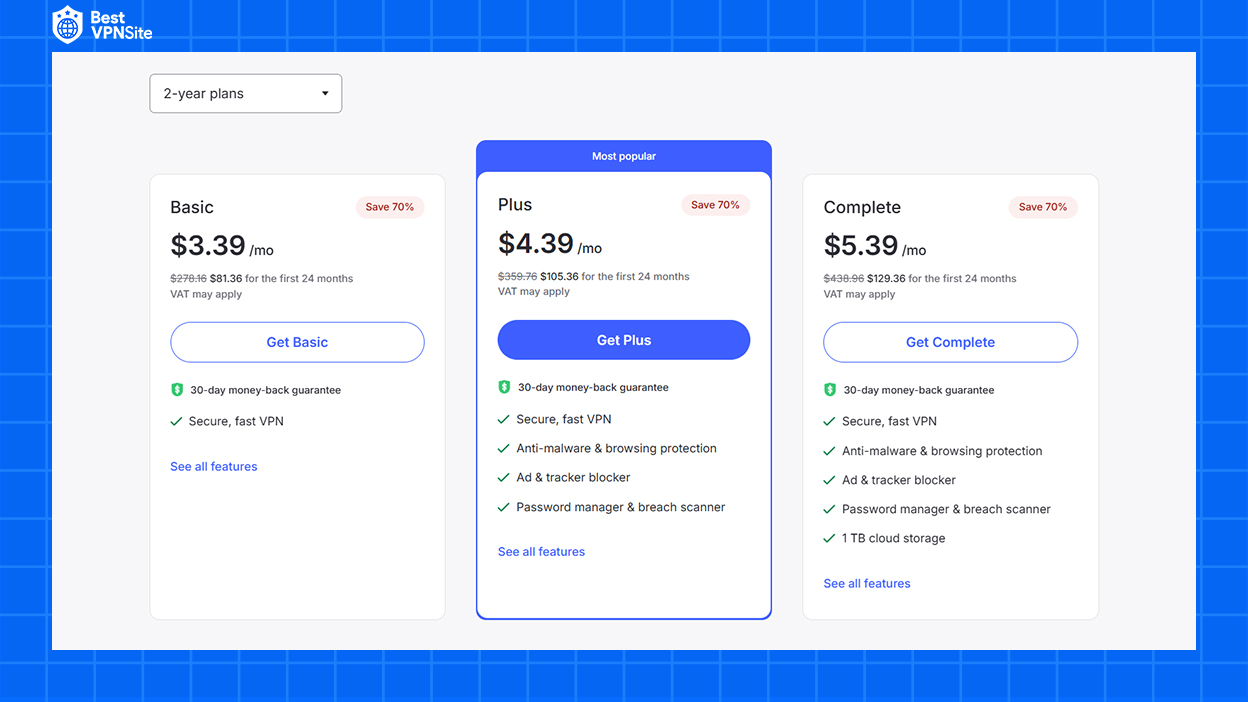
- Starts at $3.39/month (2-year plans)
- No free plan or trial, but great refund policy
NordVPN Pros:
- Balanced CLI and GUI clients for Linux
- Excellent security and privacy reputation
- Great for streaming and P2P, as also noted in the 10 Best VPNs for Torrenting in 2025 for its P2P support
NordVPN Cons:
- GUI apps rely on third-party software
- Premium prices for short-term plans
NordVPN is the most versatile and secure option for Linux users seeking both command line VPN for Linux control and GUI convenience in 2025.
2. Private Internet Access (PIA)

PIA offers one of the best VPNs that support Linux Mint, with a native GUI app that also works flawlessly on Ubuntu and Debian. Its open-source client combines customization with ease-of-use, appealing to both new and expert Linux users.
All Features:
- Supports Ubuntu, Mint, Debian, Arch
- Both GUI and CLI clients available
- Protocols: OpenVPN, WireGuard with a strong firewall
- Detailed customization and configuration options
- 30-day money-back guarantee
Pricing:

- Starts at $2.03/month (3-year plans)
- No free tier, refunds available
Private Internet Access Pros:
- Open-source app increases transparency
- Great for Mint users needing GUI access
- Configurable to match expert demands
Private Internet Access Cons:
- GUI can feel less polished
- Performance varies by server location
PIA is perfect for Linux desktop users looking for a comprehensive GUI experience without sacrificing security or customization.
3. Mullvad VPN

Mullvad is the best command line VPN for Linux enthusiasts focusing on privacy. Its no-account-creation policy and CLI-only client resonate with advanced Linux users focused on automation and anonymity.
All Features:
- Compatible with Ubuntu, Debian, Fedora, Arch
- CLI client exclusively
- OpenVPN and WireGuard protocols
- Users connect without a traditional account—ideal for anonymity
Pricing:
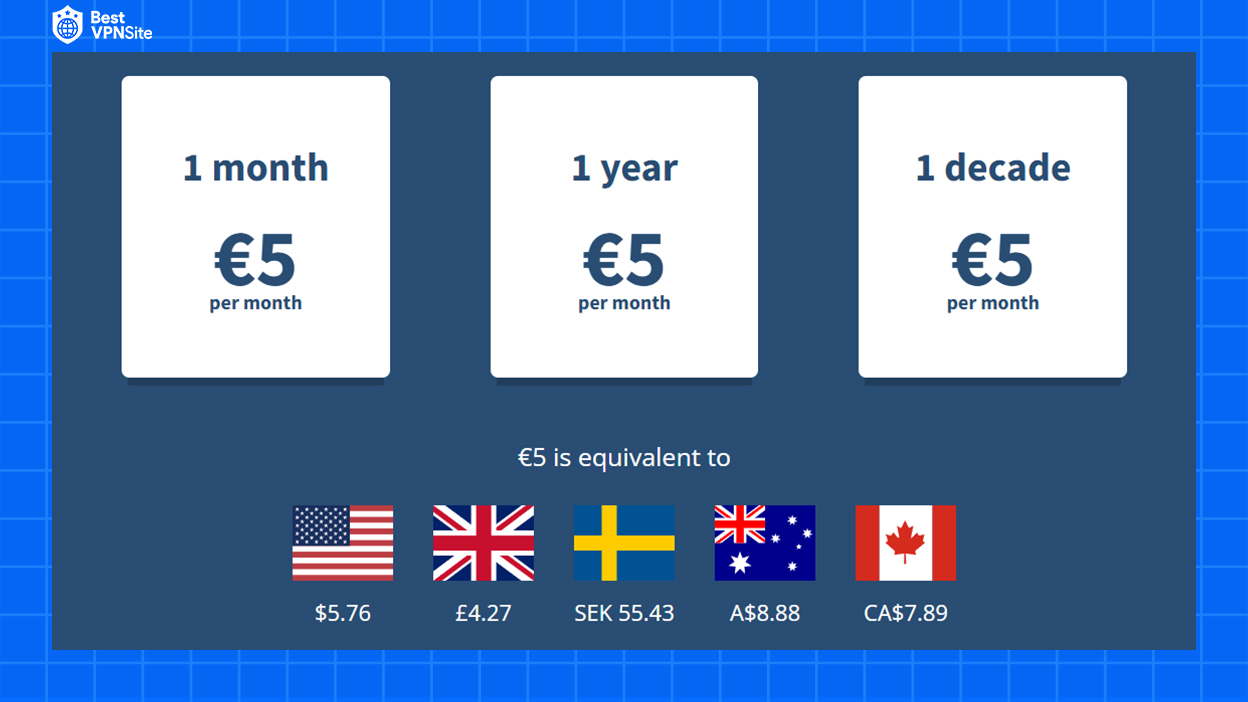
- Starts at €5/month (1-year plans)
- No free plans or money-back guarantee
Mullvad VPN Pros:
- Privacy-first with anonymous connections
- Scriptable CLI fits advanced workflows
Mullvad VPN Cons:
- No GUI for Linux
- Flat pricing with no discounts
Mullvad is unmatched for Linux users who prefer a pure, command line VPN for Linux experience centered on privacy and simplicity.
4. Proton VPN
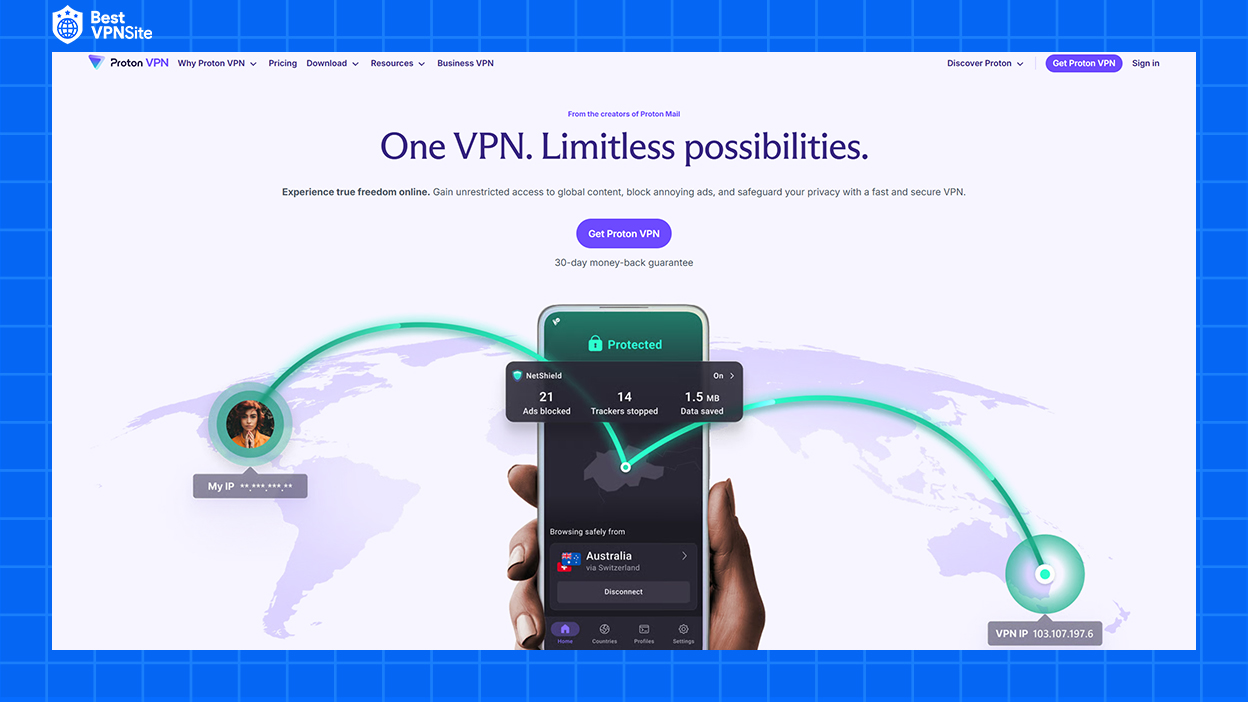
Proton VPN offers an excellent balance of accessibility and power for Linux users. Supporting a wide range of distros like Ubuntu, Mint, and Fedora, Proton VPN provides both polished GUI and CLI clients. Notably, its free plan offers unlimited data, which is rare among VPNs.
All Features:
- Supports Ubuntu, Mint, Debian, Fedora, Arch
- Both GUI and CLI clients available
- Features: kill switch, DNS leak protection, “Secure Core” multi-hop servers
- Free unlimited data plan with basic servers
- Split tunneling in GUI app
Pricing:
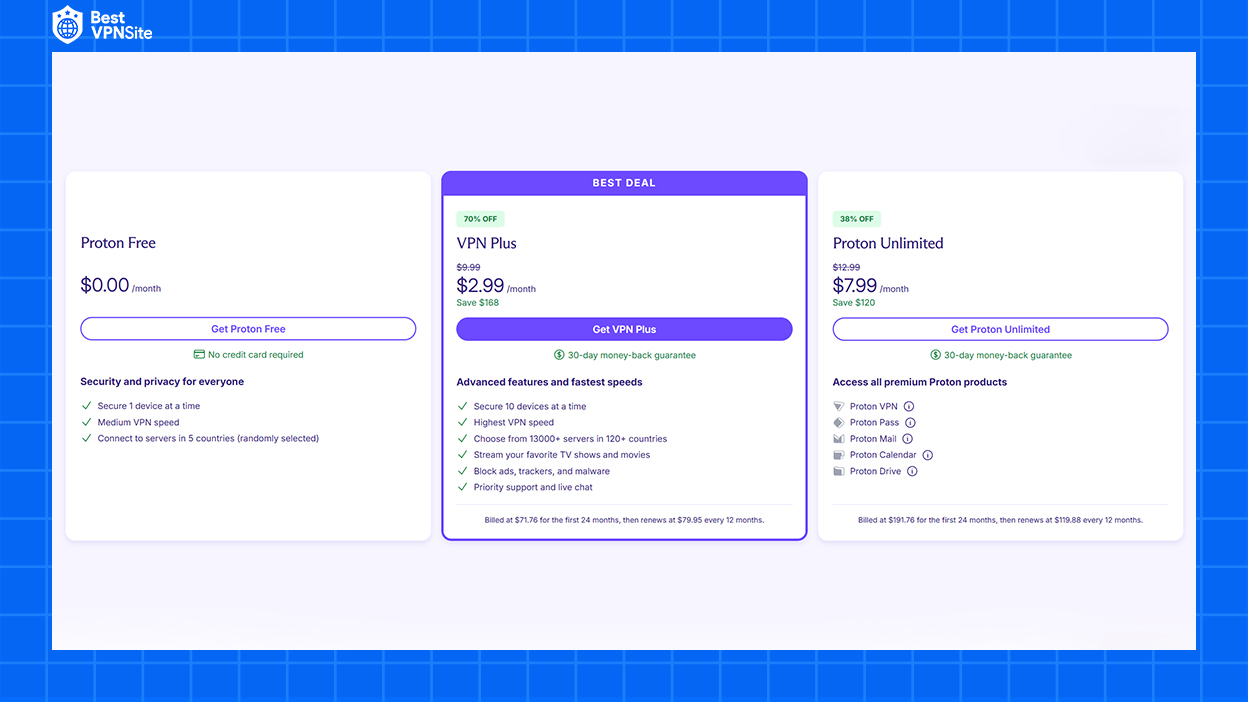
- Starts at $2.99/month (2-year plans)
- 30-day money-back guarantee
Proton VPN Pros:
- Unlimited free VPN option for Linux users
- Dual GUI and CLI availability
- Strong privacy and security audits
Proton VPN Cons:
- Free plan limited to fewer servers and speeds
- Split tunneling only supported in GUI
Proton VPN is an accessible and trustworthy choice for users seeking both VPN with GUI for Linux and free service.
5. Windscribe

Windscribe stands out as one of the top free VPNs for Linux users combining CLI convenience with ad and malware blocking. It is compatible with Ubuntu, Mint, and many other Linux distros.
All Features:
- Supports all major Linux distros
- CLI client (no native GUI for Linux)
- Supports OpenVPN and WireGuard protocols
- Free plan offers 10GB/month data cap
- Ad and malware blocking included
Pricing:

- Free 10GB/month plan
- Starts at $5.75/month (1-year plans)
Windscribe Pros:
- Generous free tier for Linux users
- Privacy features beyond standard VPNs
- Ad and malware blocking integrated
Windscribe Cons:
- No Linux GUI
- Data cap limits heavy use
Windscribe delivers a strong free VPN option, ideal for Linux users needing basic but effective online privacy.
6. IVPN

IVPN prioritizes speed and security, offering open-source tools and excellent WireGuard support. Its Linux client is CLI-based, targeting users who prefer command line efficiency.
All Features:
- Supports Ubuntu, Mint, Arch
- CLI client only (no GUI for Linux)
- Strong encryption, audited privacy practices
- WireGuard and OpenVPN support
Pricing:

- Starts at $3.89/month (3-year plans)
IVPN Pros:
- High speeds suited for streaming and servers
- Transparent privacy commitment
- Simple command-line interface
IVPN Cons:
- No Linux GUI
- Pricing mid-range
IVPN is a superb choice for users valuing speedy, transparent security with command line VPN for Linux control.
7. ExpressVPN

ExpressVPN is a powerhouse for Linux privacy and performance, supporting Ubuntu, Debian, Mint, Fedora, and Arch. It provides a robust CLI client and offers strong encryption and unblocking capabilities.
All Features:
- Supports multiple major Linux distros
- CLI app available, no native Linux GUI
- Uses TrustedServer technology, OpenVPN, Lightway protocol
- 24/7 customer support
Pricing:

- Starts at $4.99/month (2-year plans)
- 30-day money-back guarantee
ExpressVPN Pros:
- Industry-leading encryption and privacy
- Effective at unblocking streaming services, also featured in our VPNs for Streaming post
ExpressVPN Cons:
- No GUI on Linux
- Higher price point
ExpressVPN is top-tier for Linux users focused on security and global content access through CLI powering.
8. Surfshark

Surfshark combines affordability with flexible Linux support, covering Ubuntu, Debian, Mint, and Fedora with CLI clients. Unlimited device connections make it great for families or multi-device setups.
All Features:
- Supports Ubuntu, Debian, Fedora, Mint
- CLI client only (no native GUI for Linux)
- OpenVPN and WireGuard protocols
- Features ad/tracker blocking, multihop connections
Pricing:
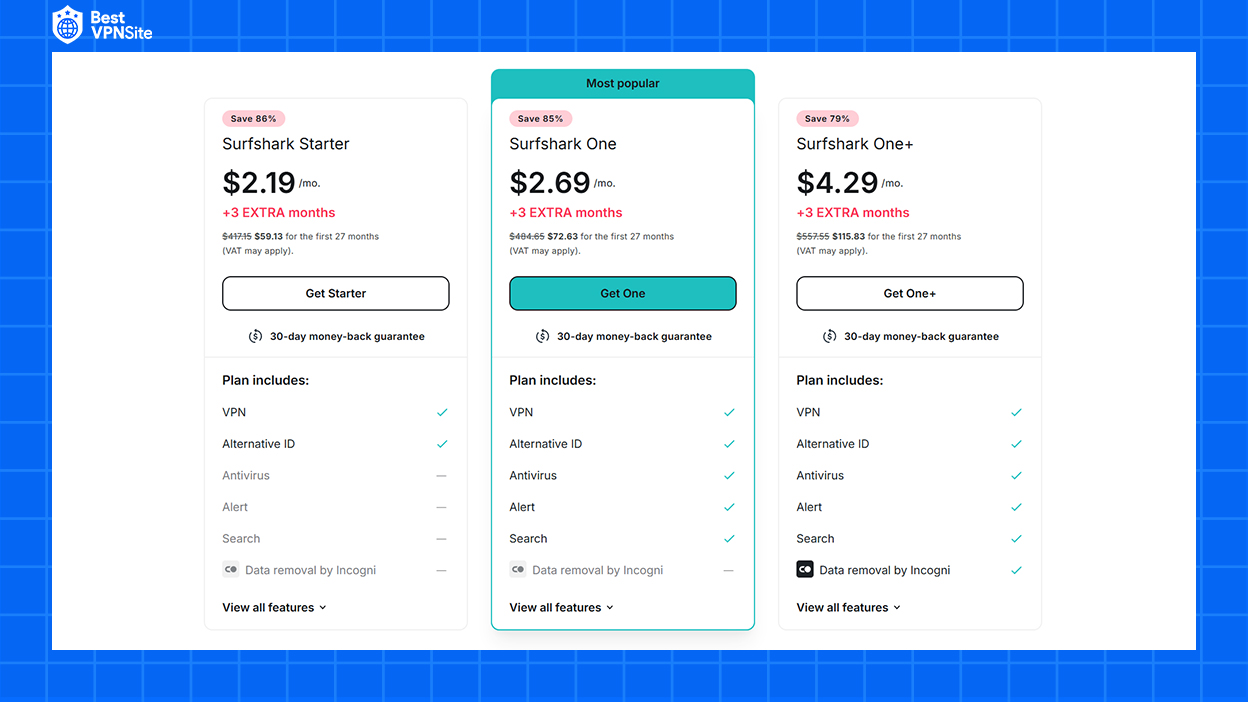
- Starts at $2.19/month (2-year plans)
- 30-day money-back guarantee
Surfshark Pros:
- Budget-friendly
- Unlimited simultaneous connections, excellent for multi-device households as noted in our VPNs for Remote Work post
Surfshark Cons:
- No GUI for Linux
- Some advanced features desktop-only
Surfshark is attractive for cost-conscious Linux users who want to protect many devices with Linux-compatible VPNs.
9. TunnelBear

TunnelBear’s Linux offering is simple and approachable, with straightforward CLI installation and use. It’s ideal for beginners who want a fuss-free VPN experience on Ubuntu, Mint, or Debian.
All Features:
- Supports Debian, Ubuntu, Mint
- CLI only
- Reliable speeds, user-friendly interface elsewhere
Pricing:

- Free 500MB/month plan
- From $4.17/month (annual plan)
TunnelBear Pros:
- Very easy to set up on Linux
- Suitable for new Linux VPN users
TunnelBear Cons:
- Strictly CLI on Linux
- Limited free data
TunnelBear provides a friendly VPN start for Linux novices seeking a simple command line VPN for Linux.
10. Hide.me
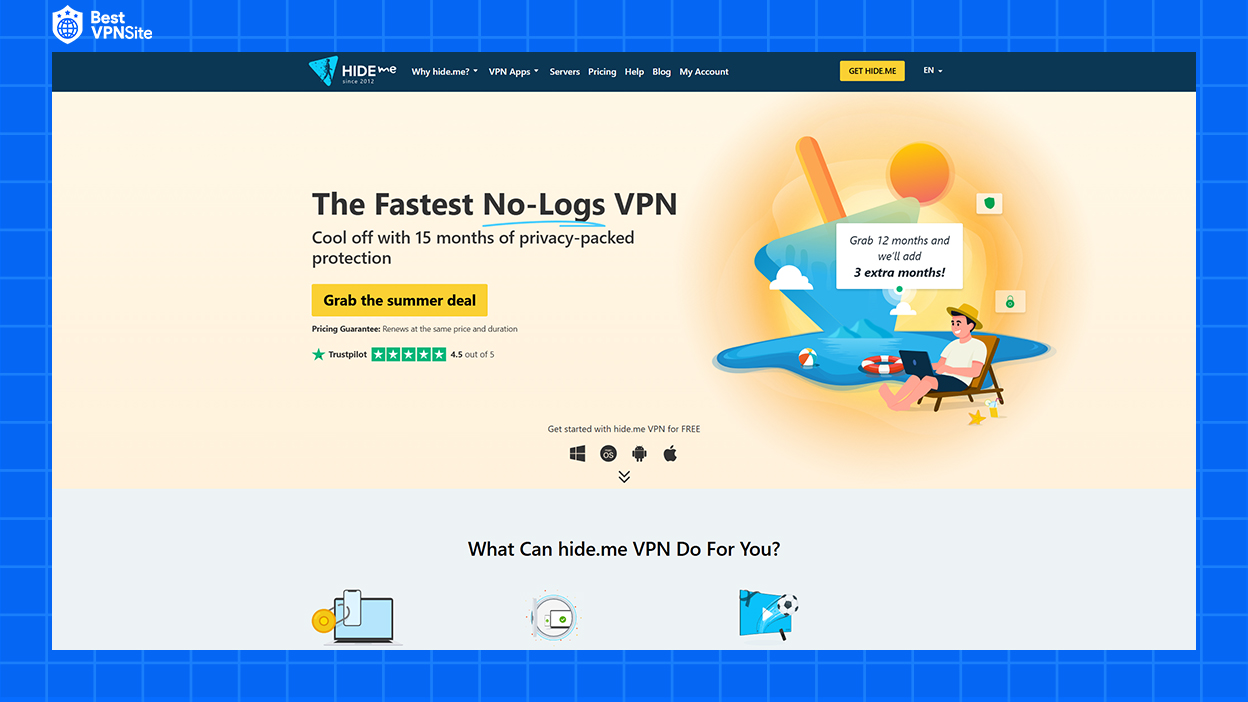
Hide.me offers extensive support across Linux distros, including Ubuntu, Debian, Mint, and Fedora. It supplies both CLI and some GUI tools, plus a 10GB monthly free tier, great for multi-distro users.
All Features:
- Broad Linux distro support
- CLI and browser-based GUI options
- OpenVPN and WireGuard
- Free 10GB data plan
Pricing:

- Free plan included
- Starts at $2.69/month (1-year plans)
Hide.me Pros:
- Supports many Linux versions
- Flexible client options
- Free tier generous
Hide.me Cons:
- Advanced features need paid subscription
Hide.me is perfect for users juggling multiple Linux distributions who want options between command line VPN for Linux and GUI control.
Tips for Using VPNs on Linux
Here are practical ways to get the most from your Linux VPN, whether you prefer CLI or GUI:
Setting Up VPNs on Linux
- Most VPNs provide
.debpackages for Ubuntu/Mint or.rpmfor Fedora/Arch. - Use terminal commands like
sudo dpkg -i vpn-package.debor package managers (aptordnf) to install. - Authenticate by running client commands (e.g.,
nordvpn login) or launching the GUI app.
Switching Between Command Line and GUI
- Begin with the GUI if you want quick toggling and visual controls.
- Switch to CLI when you need automation, scripting, or headless server use.
- Many providers allow seamless toggling without reinstall.
Troubleshooting VPN Issues
- Use
journalctlor VPN logs to diagnose drops or failures. - Check firewall or
iptablesrules to ensure VPN traffic is permitted. - Restart network managers and VPN services as needed.
Securing VPN Configurations
- Restrict permissions on config and credential files (
chmod 600). - Use strong authentication methods and enable kill switch settings to prevent data leaks.
Optimizing VPN Performance on Linux
- Connect to the nearest server to reduce latency.
- Enable WireGuard when available for faster speeds.
- Monitor bandwidth and ping with
speedtest-clior similar Linux-compatible tools.
Frequently Asked Questions (FAQs)
What is the best VPN for Linux Ubuntu in 2025?
NordVPN and Proton VPN top the list for Ubuntu due to their excellent CLI and GUI support combined with robust security features.
Are there VPNs that support Linux Mint?
Yes. PIA, Proton VPN, and NordVPN all provide native Linux Mint support with friendly GUIs and strong Linux compatibility.
How does a command line VPN for Linux work?
You install the VPN package, then use terminal commands to connect, disconnect, and configure settings. This is ideal for automation or server environments.
Is a VPN with GUI better for Linux users?
GUI clients simplify VPN use for beginners or desktop users. CLI clients offer more power and automation potential for advanced users.
Can I get free VPNs for Linux users that are safe and reliable?
Yes. Proton VPN, Windscribe, and Hide.me offer free plans with strong privacy protections for Linux.
How do I install a VPN on my Linux system?
Download your VPN’s Linux installer from the official website, use your terminal to install the .deb or .rpm package, then log in and connect using CLI commands or the GUI app.
Are Linux-compatible VPNs as secure as those on Windows or Mac?
Absolutely. Premium VPNs maintain identical encryption standards, privacy policies, and security features across all operating systems, including Linux.
Conclusion
In 2025, choosing the right VPN tailored specifically for Linux is crucial amid growing digital privacy challenges. The 10 best VPNs for Linux in 2025 we've explored provide flexible options across skill levels, including command line VPN for Linux and VPN with GUI for Linux, and strong support for popular distros like Ubuntu and Linux Mint.
Whether you seek free plans, blazing speed, or unbeatable privacy, there’s a Linux-compatible VPN for every user profile.
Protect your Linux system and maximize your online freedom today by selecting a VPN that fits your distro, workflow, and privacy needs. Your data deserves the strongest shield—choose one of these trusted VPNs to secure your Linux experience in 2025.



